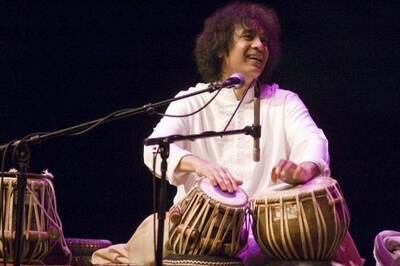
views
Singh New Delhi: Claiming to be the best in ensuring optimum oxygen for the wearer, battery-operated masks designed by an IIT-Kharagpur alumni will be put on trial for India’s Olympic-bound athletes by the IOA to assist their intense training. The IOA has tied up with IIT Kharagpur’s Piyush Agarwal, who currently owns a startup ‘PQR Technology Private Limited’ and has got government funding under the ‘KAWACH Mask Project’. His start-up is currently attached with IIT Delhi.
The brand name of the mask is ‘Moksha’. Agarwal has been in the business of designing and manufacturing masks for the last two years, starting first with pollution masks.
IOA Secretary General Rajeev Mehta said that the battery-operated masks, which cost around Rs 2200 each, will be trialled first on a few Olympic-bound athletes. If they don’t face any breathing issues and after approval from the IOA Medical Commission, the masks will then be used by all the Olympic-bound athletes and others.
“I was initially very guarded about resumption of training by athletes but since the athletes have started training and we don’t know when this pandemic will end, we have to think about the best way possible and this idea of masks which seems safe for intensive training struck us,” Mehta told PTI. “If the athletes feel comfortable in the trial, we will order 1000 masks initially. We are hoping to give the masks to 10-15 athletes initially for trial. We will start the trial in 10 days,” he added.
The training for most sports has resumed across the country but the athletes have been told to avoid intense workouts or regimens to avoid the risk of coronavirus infection. Mehta said if the Indian project is successful, the IOA can recommend the use of these masks to other countries also.
Agarwal claimed his masks will serve two purposes — save athletes from COVID-19 and allow them to do intense training thanks to a design which allows better oxygen intake than other masks. “There is no other mask in the world which provides better oxygen intake to the wearer than what we are offering. It will be safe for the athletes to wear these masks and do intensive training also,” he said. The masks will be carried by the athletes in a pouch when not in use. Each mask has two respiratory valves with a fan on both sides. The fans do not produce any sound. Both the valves will have N95 air filters to protect the athlete from COVID-19 virus. The left valve is meant for inhalation while the right would open for exhaling.
“The fan on the left valve will suck air which will pass through the N95 filter. The right valve meant for exhaling also has the N95 filter so that other people are protected.” The batteries can be tied to the waist or arms of the athletes through a cord. Once charged, they will last eight hours. “A normal human being requires 8 litres of air but an athlete, during training, needs 15-20 litres. These masks will allow maximum oxygen for inhalation and so they should not face any problem,” Agarwal said.
Medical experts have expressed fear that some amount of carbon dioxide may remain inside the masks during exhalation but Agarwal said the fans in each valve are powerful enough to ensure that there is no residue. “A normal household exhaust fan has around 4000 rpm (revolutions per minute) but the fans in these masks have 8500 rpm, so there is no chance of any carbon dioxide remaining,” he said.
“I have applied for patent also but it takes five years in India (to get approved).” .
Disclaimer: This post has been auto-published from an agency feed without any modifications to the text and has not been reviewed by an editor

















Comments
0 comment